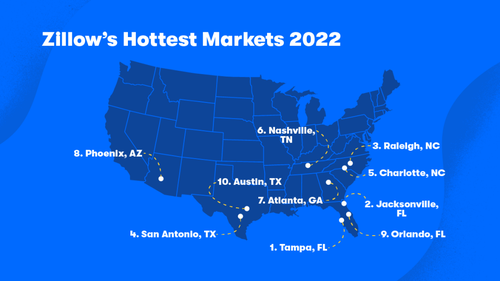The Charlotte Region’s real estate market is already red hot with prices at record highs but those prices are expected to climb even higher in 2022 and the Charlotte market will be the fifth hottest market in the U.S. this year, a new study found.
Real estate company Zillow released its annual list of the hottest U.S. Housing markets for 2022 with a host of relatively affordable, fast-growing Sun Belt markets dominating the top locations.
North Carolina boasts two cities in the top 10: Charlotte ranking at No. 5, and Raleigh, which came in at No. 3.
Tampa, Jacksonville, Raleigh, San Antonio and Charlotte fill out the list of the top five hottest markets for 2022, each buoyed by a combination of strong forecasted home value growth, strong economic fundamentals including high job growth, fast-moving inventory and plentiful likely buyers. Additionally, these markets have historically not been particularly sensitive to rising mortgage interest rates or a slowing stock market – two risk factors for housing and the economy overall as the calendar turns.
Austin, the market which ranked No. 1 overall last year, fell to No. 10 on the 2022 list.
“Homebuyers are attracted to markets in the Sun Belt that offer relative affordability, fast-growing economies and weather that allows them to enjoy the outdoors year-round,” Zillow economist Alexandra Lee said. “Across the board, sellers will remain in the driver’s seat, but especially so in the hottest markets. Buyers should be ready for strong competition for homes, which means bidding wars and homes flying off the market only days after they are listed.”
According to Zillow, the typical home value in Charlotte is more than $329,000. The online real estate company expects home values to rise by 21% through November. The company factored in the Charlotte Region’s job market and limited availability of homes for sale.
Home value growth in 2021 consistently broke records, both nationally and in many local markets. This growth, according to Zillow, has been fueled by historically low mortgage interest rates, pandemic-influenced decisions on where households want to live, and demographic shifts – both from aging millennials and retiring/downsizing boomers – that have all combined to keep housing demand very high. At the same time, inventory of available housing has been limited, as builders play catch-up after years of underbuilding and sellers list their homes in fewer numbers. None of those trends is expected to change much in 2022 from 2021, and limited housing supply coupled with sky-high housing demand is a classic Econ 101 recipe for rising home values, researchers explained.
To learn more about the expected inventory and velocity, demographics, and risks, click here.
Map courtesy: Zillow



